
Magic is a 1978 American psychological horror film starring Anthony Hopkins, Ann-Margret and Burgess Meredith. The film, which was directed by Richard Attenborough, is based on a screenplay by William Goldman, who also wrote the novel upon which it was based. The score was composed by Jerry Goldsmith.

Charles Clarence Robert Orville Cummings, was an American film and television actor known mainly for his roles in comedy films such as The Devil and Miss Jones (1941) and Princess O'Rourke (1943), but was also effective in dramatic films, especially two of Alfred Hitchcock's thrillers, Saboteur (1942) and Dial M for Murder (1954). Cummings received five Primetime Emmy Award nominations, and won the Primetime Emmy Award for Best Actor in a Single Performance in 1955. On February 8, 1960, he received two stars on the Hollywood Walk of Fame for his contributions to the motion picture and television industries. The motion picture star is at 6816 Hollywood Boulevard, the television star is on 1718 Vine Street.

The Roots of Heaven is a 1958 American adventure film in CinemaScope and DeLuxe Color made for 20th Century Fox, directed by John Huston and produced by Darryl F. Zanuck. The screenplay by Romain Gary and Patrick Leigh Fermor is based on Romain Gary's 1956 Prix Goncourt winning novel The Roots of Heaven.

Thomas Frank Mankiewicz was an American screenwriter, director, and producer of motion pictures and television, best known for his work on the James Bond films and his contributions to Superman: The Movie and the television series Hart to Hart. He was the son of Joseph Mankiewicz and nephew of Herman Mankiewicz.

Soldier in the Rain is a 1963 American comedy buddy film directed by Ralph Nelson and starring Jackie Gleason and Steve McQueen. Tuesday Weld portrays Gleason's character's romantic partner.
Elliott Kastner was an American film producer, whose best known credits include Where Eagles Dare (1968), The Long Goodbye (1973), The Missouri Breaks (1976) and Angel Heart (1987).
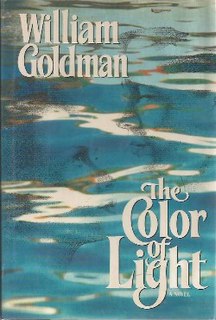
The Color of Light is a novel by William Goldman, published in 1984. It is about the life of writer Charles 'Chub' Fuller, who while attending Oberlin College from 1968 to 1972 channels his childhood experiences as the only child of an alcoholic, suicidal father and a moody, impossible-to-please mother into a series of short stories, shared only with his friend and foil Stanley 'Two-Brew' Kitchel.
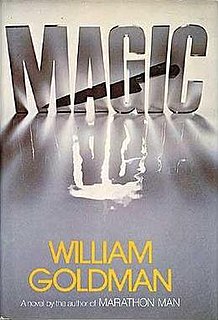
Magic is a psychological horror novel written by William Goldman. It was published in the United States in August 1976 by Delacorte Press. In 1978 Richard Attenborough directed a feature film adaptation of the story that starred Anthony Hopkins and Ann-Margret.

And Now Tomorrow is a 1944 American drama film based on the best-selling novel, published in 1942 by Rachel Field, directed by Irving Pichel and written by Raymond Chandler. Both center around one doctor's attempt for curing deafness. The film stars Alan Ladd, Loretta Young, and Susan Hayward. Its tagline was Who are you that a man can't make love to you?. It is also known as Prisoners of Hope.

Mr. Horn is a 1979 television film chronicling the life of Tom Horn. It was directed by Jack Starrett from a screenplay by William Goldman.
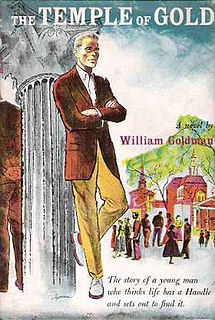
The Temple of Gold is a 1957 novel by William Goldman. It was Goldman's first novel, and launched his career.

Boys and Girls Together is a 1964 novel by William Goldman. The title is taken from lyrics in the song, "The Sidewalks of New York".
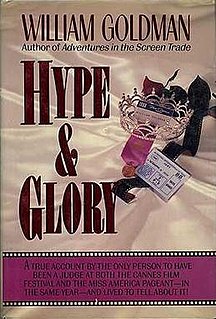
Hype and Glory is a 1990 memoir from William Goldman which details his experiences as a judge at the 1988 Cannes Film Festival and Miss America Pageant. The book includes an interview with Clint Eastwood and a profile on Robert Redford. Much of the book contains autobiographical material from Goldman, including accounts of his recent divorce.
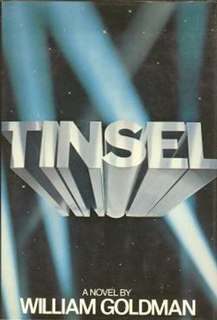
Tinsel is a 1979 novel written by William Goldman. It was the third of a four-book deal he had with Delacorte Press after Marathon Man and Magic. He called it "my Hollywood novel." +

Heat is a 1985 novel by William Goldman about a soldier of fortune in Las Vegas.
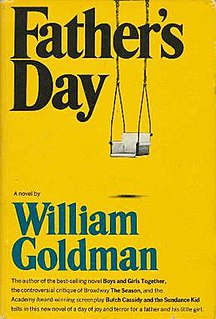
Father's Day is a 1971 novel by William Goldman. It is a sequel to The Thing of It Is... and revolves around a day in the life of now-divorced Amos McCracken as he looks after his daughter for a day.
Blood, Sweat and Stanley Poole is a 1961 play by William Goldman and James Goldman. Both Goldman brothers had served in the army and the play is about a supply sergeant at an army post in the south.
Killing of the Unicorn: Dorothy Stratten 1960-1980 is a book by Peter Bogdanovich detailing the relationship between Bogdanovich and Dorothy Stratten, the making of They All Laughed and Stratten's murder. There is also criticism of Hugh Hefner and Playboy and its treatment of women.

No Way to Treat a Lady is a 1964 novel by William Goldman.


















